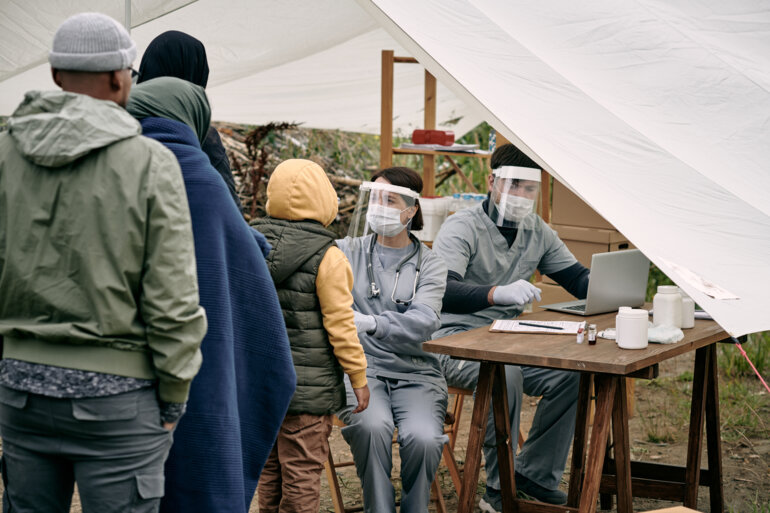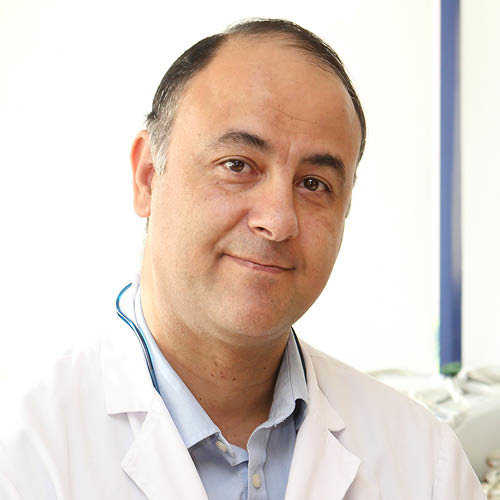In recent conflicts, good response to the health needs of refugees with cancer in receiving countries is consequence of an analysis of local cancer centres capacity and special measures to avoid fragmented care
Healthcare in war zones has traditionally focused on infectious diseases and maternal, reproductive and child health, but contemporary conflicts in the Middle East, Latin America, Sub-Saharan Africa and now Europe are occurring in countries with relatively high burdens of cancer. This means that significant numbers of refugees and internally displaced people need to continue their treatment for cancer when they arrive in host countries or other new locations, with the additional likelihood of new cases being diagnosed in these populations in the mid-term. Professor Richard Sullivan, Conflict and Health Research Group, King’s College, London, UK, and non-communication diseases advisor to the World Health Organization (WHO) discusses the implications for the global oncology community.
What are the greatest challenges for countries trying to care for refugees with cancer?
In recent conflicts in low- and middle-income regions, we have seen a major problem with refugees arriving in countries that have relatively under-developed oncology services which struggle to care for their own people with cancer, let alone an influx of refugees with cancer (Confl Health 2022 16:3; eCancer 2020: 14:1039-79).
In the war in Ukraine, we are currently seeing unprecedented numbers of people arriving in Poland, for example, which has well-established cancer services but is experiencing some pressure, and in Moldova and Romania, which are already struggling to meet patient needs.
In many cases, refugees arrive with no medical notes and some may not even know what type of cancer they have. This makes their care very technically challenging, and clinicians may need to start again with diagnostic tests before they can work out the best treatment, leading to delays in potentially curative therapy. Another challenge is that refugees bring the chaos of their own country with all their experiences of physical and psychological trauma, putting additional strain on support services, and potentially jeopardising cancer outcomes (PLoS Med. 2020 Dec 1;17(12):e1003392).
How well are health systems working for Ukrainian refugees?
At the moment, health systems are reasonably on top of cancer care for Ukrainian refugees. Where possible, oncologists in Ukraine are contacting colleagues in other European countries to arrange care for patients and, as there is a reasonably high level of health literacy in Ukraine, some patients have rung cancer centres themselves to ask for help.
A much bigger problem will arise over the next six months, when refugees start presenting for the first time with cancer symptoms in the country where they are living. There would normally be about 13,000 new cases of cancer per month recorded in Ukraine and even if only half that number present, there will still by a substantial need for care. As we have seen in Syrian refugees with new cancers (J Int Med Res. 2021 May;49(5):3000605211018448), many of these patients will present with late-stage disease because of delays in seeking help while they are moving, seeking a safe place to live.
What has been shown to work in addressing challenges?
We have learned a lot from recent conflicts, for example, in Syria. We have learned the need to better understand capacity in countries receiving refugees and to have clear pathways of care, though these may differ between countries. It is not always easy to judge the capacity of a hospital or cancer centre because it can be pretty elastic, but a good guide is waiting time to diagnosis, waiting time to treatment and working capacity for key technology, such as radiotherapy machines. Knowing those numbers tells you whether a centre is already ‘running hot’, and gives a good indication of whether it is realistic to include it in a care pathway for refugees.
Turkey stands out in having been able to respond rapidly to the needs of refugees with cancer arriving from Syria, because it has universal healthcare coverage and has enacted cancer care reforms under its national cancer control plan (NCCP). It has the capacity and capabilities to help but, even so, recent research has demonstrated significant delays in cancer diagnosis, reflecting the complex route to cancer care experienced by Syrian refugees as well as economic and other factors (Confl Health 2022 Jan 31;16(1):3). Jordan is a close second to Turkey in what it has been able to offer refugees with cancer, while, unfortunately, those arriving in Lebanon found it much harder to access cancer care owing to the largely private healthcare system.
It is easier to treat cancer when refugees stay in one place, but this may not be possible. For example, there are Syrian refugees still travelling back and forth into Turkey from North-West Syria and there are also refugees in communities in the cities of Konya and Gaziantep, as well as migratory refugees. As a result, a fluid system has been established where care is split between numerous different cancer centres around the country and patients are triaged according to their needs – much as they would be in European countries. In contrast, in Jordan, most refugees are in the Zaatari Camp and, if they become ill, they are referred to only one cancer centre in Amman.
Overall, the important lessons learnt from recent conflicts is to avoid fragmented care with patients being bounced between centres that cannot cope, because this is likely to lead to poorer outcomes.
How do different agencies coordinate support?
The United Nations High Commissioner for Refugees (UNHCR) is mandated to aid and protect refugees and requires that healthcare is provided free of charge to those arriving in host countries but, realistically, it is largely left to health ministries in individual countries to decide what can be offered.
The World Health Organization (WHO) has the difficult task of integrating ministries of health and the interagency task force to negotiate how many refugees can be accepted in different countries and how costs will be met and, not least, gathers information about what is happening on the ground.
At the same time, the European Cancer Organisation-American Society of Clinical Oncology (ECO-ASCO) Special Network on the Impact of the War in Ukraine on Cancer gathers information from cancer centres about refugees presenting and being treated and their stage of disease, and tries to track how they reached a centre. In addition, a variety of smaller advocacy, funding and technical support groups help refugees access the care they need.
ESMO could have an important role in advocating for good cancer care for refugees in Europe and for good national policies for looking after vulnerable patients – not just those from Ukraine but the many other refugees from the Middle East and Africa who find themselves in Europe.
There is also an opportunity to encourage countries to develop, revise, implement and fund NCCPs, and to establish affordable packages of cancer care in conflict situations. It is unrealistic to think we can include latest biologicals, immunotherapies, CAR-T cell therapy – or for patients to expect them – but we also cannot be giving refugees systemic therapies that are going to make them sick and need additional hospital treatment. We need to focus on therapies that are of real value to refugees with cancer, based on the WHO Model Lists of Essential Medicines, and get a better understanding of the quality of care that they receive.
What will be the impact of current conflicts on the global oncology community in the years ahead?
With so much devastation in conflict zones such as Ukraine and Syria, I think we can expect to see a lot of oncologists leaving these countries and settling where there are cancer centres which are short of specialists. It is a disaster for the countries they are leaving because, while you can rebuild hospitals, it can take decades for doctors to return or to train a new generation.
For oncologists taking on additional workload in countries receiving refugees, it is likely to be tough. There is already some burn-out from all the extra work needed during the pandemic and this can only get worse.
Lastly, there is the financial impact of treating all the additional patients coming from war zones. Where will the money come from, and will it be an economic burden too far for some countries?







